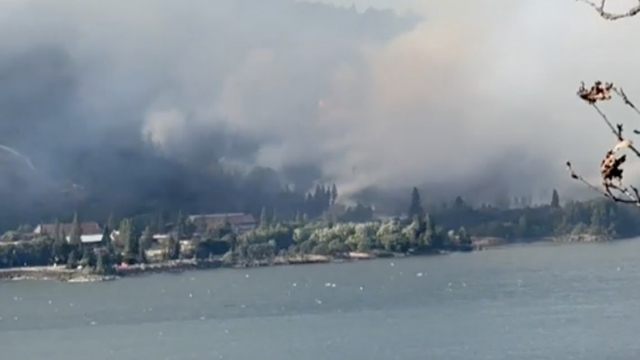A red flag warning is in place in the Northwest, meaning the conditions are just right for a wildfire to start and to spread. According to the National Weather Service, we have El Nino to thank.
"Things are definitely warm. We're very, very dry," said Rebecca Muessle, meteorologist with the National Weather Service in Portland.
Muessle says there's been a trough of high pressure sitting over the Pacific Northwest for the last week, creating conditions perfect for wildfire.
More than 150 emergency workers have been battling the Tunnel 5 fire in southern Washington along the Oregon border.
That fire has burned 533 acres so far and is only 5% contained. Fire officials issued evacuation orders for people within a 2-mile radius of the fire.
Firefighters are using the nearby Columbia River to their advantage, scooping up water with aircraft to douse the flames.
Currently, the cause of the fire is under investigation.
Muessle said that vegetation is as dry right now as it usually is in August. She says El Nino is to blame for winds carrying warm air from the Pacific Ocean to the area.
"Last year we had a very wet June," Muessle said. "This year it's been very dry, so it wouldn't necessarily be abnormal. But it is definitely drier and warmer than what we have seen over the last couple of years."
She says 85% of wildfires are human-caused, and even if you don't live in the Northwest, it's crucial to be aware of how easily fires can start, especially when grills or fireworks are involved.
"Grills, do not leave them unattended," Muessle said. "Make sure that if you are using fireworks that you have the capability to put them out safely. And then the No. 1 thing is make sure that you are following any local bans or fire restrictions."
She says fire can start quickly and easily; something as simple as parking a car on dry grass can spark a wildfire.
"People really do have that influence, and it's up to them to protect our communities," she said.
It may sound like those fire bans are meant to put a damper on July 4 activities, but they're not just keeping our property safe — but our loved ones too.
SEE MORE: Extreme heat, powerful storms hitting US ahead of holiday
Trending stories at Scrippsnews.com




